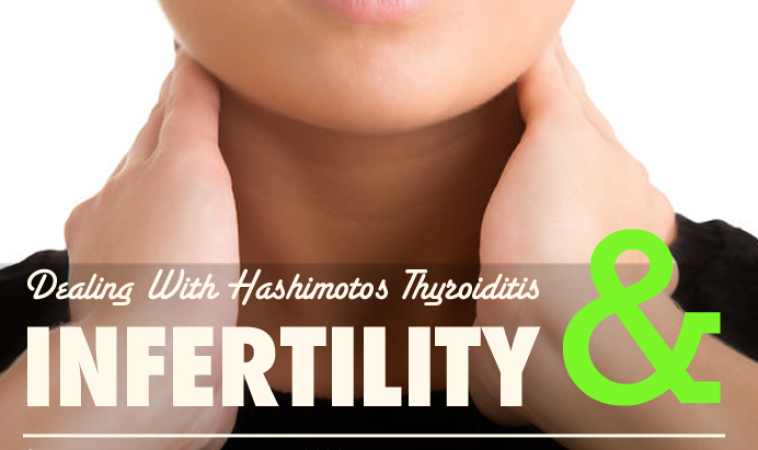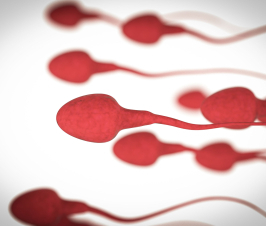The Autoimmune and Infertility Relationship
Autoimmunity of the thyroid gland is well known as a major influencer of infertility, particularly in those struggling with Hashimotos thyroiditis.1 Hashimotos is an automimmune condition in which the body begins to attack the thyroid gland, resulting in hypothyroidism or an underproduction of thyroid hormones. Underproductive thyroid hormones may result in a variety of symptoms including decreased metabolism, fatigue, joint pain, hair loss, depression, and menstrual irregularities. Often, women diagnosed with Hashimotos have a history of experiencing skipped periods, long periods, heavy bleeding, missed ovulation, progesterone deficiency, and an imbalance of the estrogen to progesterone ratio. These issues are also seen in women who experience infertility, particularly in the case of low progesterone, a hormone highly correlated with miscarriages.2 Even thyroid states classified as ‘subclinical’ (meaning lab results are within normal range but not in an optimal range) may affect hormonal imbalances resulting in infertility, as they play an important role in the development of oocytes or immature eggs in the ovaries.
In women who have thyroid autoimmunity, it is up to 40% more common to have an immune response targeted toward the uterus. Thyroid antibodies can alter fertility rates by attacking various receptors and placental antigens in the uterus.3 If a woman is struggling with infertility related to Hashimotos, there are several treatment options designed to assist in balancing hormone levels while also reducing the autoimmune response.
Factors in Improving Fertility Rates in those Diagnosed with Hashimotos
- Vitamin D:It is well documented that low levels of vitamin D trigger autoimmunity through modulating T-regulatory cell function.4 T-regulatory cells are part of the immune system that control the immune response type and severity. To simply put it, in autoimmune disease there is too much response of one particular facet of the immune system. Modulating an overactive T-regulatory cell response helps to regulate the immune response.5 Vitamin D is not only a predisposing factor towards autoimmune disease, but also is linked to infertility and pregnancy loss. Even in southern California where you would think people get plenty of sunshine, I find that my patient population is still deficient in Vitamin D. With our busy lives, we tend to spend too much time inside.6
- Minerals and antioxidants.Nutrient imbalances, specifically low zinc, selenium, and antioxidants, increase autoimmune flares7 as these particular nutrients also alter T-regulatory cell function. Specifically, there is growing research showing that curcumin, a component of turmeric, alters T cell response.8 Because of this response, curcumin acts as an anti-inflammatory as well as an anti-oxidant, improving immune modulation.
- Methylation status: Autoimmune disease is genetic, so it is important to look at the patient’s methylation status when addressing symptoms and developing a treatment plan. In short, methylation is the process that turns genes “on” and “off.” For example, let’s say 2 patients have a genetic predisposition for Hashimotos, yet one patient never experiences typical Hashimotos signs or symptoms and thus is never diagnosed. Due to many factors including diet any lifestyle, these genes can activate or deactivate, similar to turning a light switch off or on. Depending on the patient’s genetic picture, their body may require more B12, folate, minerals, or amino acids to correctly turn the genetic pathways to the “off” setting.
- Food. What we eat has the ability to drastically shift the immune response. Food sensitivities and food allergies can be part of the triggering events in activating an autoimmune flare. Looking towards the diet as a primary source of nutritional anti-oxidants can provide a healthier meal that is less immune-stimulating. Food ismedicine, so looking at cleaning up the diet can lower the immune burden.9
While these are only part of the connection between Hashimotos and fertility, they offer important concepts to bring up with your primary care physician should you experience any of the addressed issues. In order to successfully treat Hashimotos, it is important to understand the underlying triggers for your body. Everyone has a unique combination of triggers that drive autoimmune disease forward. Understanding your pattern of triggers can have a positive impact on fertility rates while lowering the autoimmune response.
 Dr. Abercrombie is a California Licensed Doctor of Naturopathic Medicine. While she maintains a general practice, she specializes in women’s health, fertility, PMS, cervical dysplasia, auto-immune disease, thyroid conditions, adrenal dysfunction, mood balance, gastrointestinal disorders, and pediatrics. Dr. Abercrombie understands illness as a disruption of physiology and normal function of the body. She strives to identify and remove barriers to healing while supporting the innate ability of the body to heal; empowering her patients with their personal health. She received her doctorate from the National College of Natural Medicine in Portland, Oregon. She completed a year gynecology specialized internship with Dr. Kimberly Windstar-Hamlin, ND, which emphasized women’s health concerns, cervical dysplasia, as well as infertility, thyroid disorders, and autoimmune diseases. Dr. Abercrombie is an active member of the American Association of Naturopathic Physicians, the California Naturopathic Doctors Association, the American College for Advancement in Medicine, and the Endocrinology Association of Naturopathic Physicians.
Dr. Abercrombie is a California Licensed Doctor of Naturopathic Medicine. While she maintains a general practice, she specializes in women’s health, fertility, PMS, cervical dysplasia, auto-immune disease, thyroid conditions, adrenal dysfunction, mood balance, gastrointestinal disorders, and pediatrics. Dr. Abercrombie understands illness as a disruption of physiology and normal function of the body. She strives to identify and remove barriers to healing while supporting the innate ability of the body to heal; empowering her patients with their personal health. She received her doctorate from the National College of Natural Medicine in Portland, Oregon. She completed a year gynecology specialized internship with Dr. Kimberly Windstar-Hamlin, ND, which emphasized women’s health concerns, cervical dysplasia, as well as infertility, thyroid disorders, and autoimmune diseases. Dr. Abercrombie is an active member of the American Association of Naturopathic Physicians, the California Naturopathic Doctors Association, the American College for Advancement in Medicine, and the Endocrinology Association of Naturopathic Physicians.
References:
- Dittrich, R, Beckmann, MW, Oppelt, PG, et al. Thyroid hormone receptors and reproduction. Science Direct. 2011. Available at: http://www.sciencedirect.com/science/article/pii/s0165037811001057. Accessed June 10, 2015.
- Casey, BM, Dashi, JS, Wells, EC, et al. Subclinical Hypothyroidism and Pregnancy Outcomes : Obstetrics & Gynecology. LWW. 2015. Available at: http://journals.lww.com/greenjournal/abstract/2005/02000/subclinical_hypothyroidism_and_pregnancy_outcomes.5.aspx. Accessed June 10, 2015.
- Twig, G, Shina, A, Shoenfeld, Y. Pathogenesis of infertility and recurrent pregnancy loss in thyroid autoimmunity. Science Direct. 2012. Available at: http://www.sciencedirect.com/science/article/pii/s0896841111001272. Accessed June 10, 2015.
- Choi, YM, Kim, WG, Kim, TY, et al. Low levels of serum vitamin D3 are associated with autoimmune thyroid disease in pre-menopausal women. National Center for Biotechnology Information. 2014. Available at: http://www.ncbi.nlm.nih.gov/pubmed/24320141. Accessed June 11, 2015.
- Twig, G, Shina, A, Amital, H, Shoenfeld, Y. Pathogenesis of infertility and recurrent pregnancy loss in thyroid autoimmunity. Pathogenesis of infertility and recurrent pregnancy loss in thyroid autoimmunity. 2012. Available at: http://www.sciencedirect.com/science/article/pii/s0896841111001272. Accessed June 11, 2015.
- Prietl, B, Treiber, G, Pieber, TR, Amrein, K. Vitamin D and immune function . National Center for Biotechnology Information. 2013. Available at: http://www.ncbi.nlm.nih.gov/pubmed/23857223. Accessed June 11, 2015.
- Arikan, TA. Plasma selenium levels in first trimester pregnant women with hyperthyroidism and the relationship with thyroid hormone status. National Center for Biotechnology Information. 2015. Available at: http://www.ncbi.nlm.nih.gov/pubmed/25796516. Accessed June 11, 2015.
- Rogers, NM, Kireta, S, Coates, PT. Curcumin induces maturation-arrested dendritic cells that expand regulatory T cells in vitro and in vivo. National Center for Biotechnology Information. 2010. Available at: http://www.ncbi.nlm.nih.gov/pubmed/21070208. Accessed June 11, 2015.
- Gostner, J, Clardi, C, Becker, K, Fuchs, D, Sucher, R. Immunoregulatory impact of food antioxidants. National Center for Biotechnology Information. 2014. Available at: http://www.ncbi.nlm.nih.gov/pubmed/23701561. Accessed June 11, 2015.

















